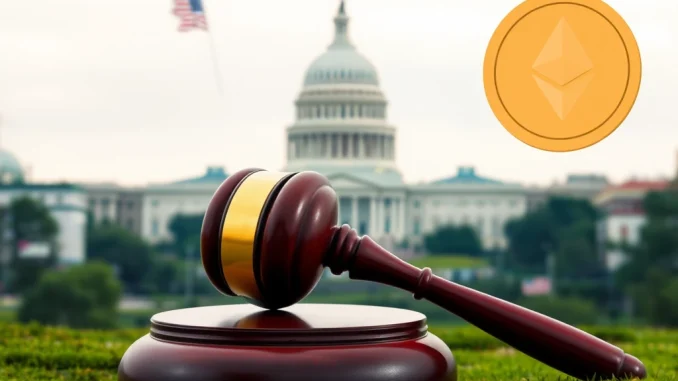
News broke recently about a significant move concerning US crypto regulation. A group of Democratic lawmakers in the U.S. House of Representatives has introduced a bill aimed squarely at limiting the involvement of top government officials and their families in the cryptocurrency market. This development highlights ongoing concerns about potential conflicts of interest as digital assets become more mainstream.
What Does the Proposed Maxine Waters Crypto Bill Entail?
Led by California Representative Maxine Waters, the proposed legislation is formally known as the ‘Stop Trading, Retention, and Unfair Market Payoffs in Crypto Act of 2025’ (STREAM Pay Act). At its core, the bill seeks to draw a clear line between public service and personal financial interests within the crypto space. Here are the key aspects:
- Who is Affected? The ban would apply to the President, Vice President, members of Congress, and their immediate family members.
- What is Prohibited? It specifically targets owning a stake in a particular cryptocurrency large enough to potentially allow the individual to unilaterally influence or make changes to that cryptocurrency.
- Why the Bill? The stated goals include addressing concerns about executive branch involvement in crypto and putting an end to what the proponents term ‘crypto corruption’.
The bill reflects a growing sentiment among some lawmakers that individuals in positions of power should not hold significant financial interests in assets they may regulate or whose value they could influence through policy decisions.
Why Are Politicians Crypto Ownership Holdings a Concern?
The debate around politicians and their investments isn’t new, but cryptocurrency adds unique complexities. The decentralized nature of many digital assets, combined with their volatility and the rapid pace of technological change, creates a novel landscape for potential conflicts of interest. When lawmakers or executive officials hold substantial amounts of a specific crypto asset, questions arise:
- Could their personal holdings influence their decisions on crypto legislation or regulation?
- Do they possess non-public information that could give them an unfair trading advantage?
- How does public trust in government institutions fare when officials are perceived to benefit financially from the very markets they oversee?
This bill is a direct response to these concerns, aiming to bolster transparency and accountability in the digital asset age.
The Push for Crypto Ethics in Government
The introduction of the STREAM Pay Act underscores a broader push for establishing clear ethical guidelines regarding cryptocurrency for those in public office. While existing ethics rules cover financial disclosures and conflict of interest, the unique characteristics of crypto assets may necessitate specific, tailored regulations. Proponents of the bill argue that banning significant ownership stakes is a necessary step to prevent potential abuses and ensure that policy decisions are made in the public interest, not for personal gain.
The timing of the bill also comes amidst increased political engagement with the crypto community, including reports of events like the one Coin Pulse previously covered regarding U.S. Democratic Party lawmakers planning a protest ahead of a memecoin-related dinner involving figures like Donald Trump. This political backdrop highlights the increasing intersection of cryptocurrency and the U.S. political landscape, making the need for clear ethical boundaries more pressing.
Potential Impact on Government Crypto Policy
If passed, the STREAM Pay Act could have several implications for how government crypto policy is perceived and developed. By removing the potential for personal financial conflicts among top officials, the bill’s supporters hope to foster a more neutral and trust-inspiring environment for crafting regulations. However, defining what constitutes a ‘significant stake’ that enables unilateral change in a cryptocurrency could be complex and subject to interpretation, potentially posing challenges for enforcement.
This bill represents just one piece of the larger puzzle of how governments worldwide are grappling with integrating digital assets into existing legal and financial frameworks while maintaining public trust. It signals a growing recognition that the rise of crypto requires careful consideration of ethical implications for public servants.
Conclusion: A Step Towards Greater Transparency?
The proposed ‘STREAM Pay Act of 2025,’ championed by Representative Maxine Waters and other Democrats, is a significant legislative effort targeting politicians crypto ownership. By aiming to prevent top officials and their families from holding substantial stakes in cryptocurrencies, the bill seeks to enhance crypto ethics within government and address potential conflicts of interest head-on. While its passage and implementation face hurdles, the bill itself is a clear indicator of the increasing scrutiny on the intersection of politics and digital assets, pushing for greater transparency and accountability in US crypto regulation and overall government crypto policy.
It’s a development worth watching for anyone interested in the future of cryptocurrency and its relationship with global governance.



